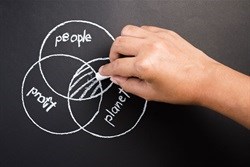
Top stories






More news


Marketing & Media
Ads are coming to AI. Does that really have to be such a bad thing?














The question you should be asking yourself is: are you driving your organisation toward a sustainable future?
After nearly a decade observing various industry players (both business and NGOs) and listening to the discourse driving the engagements about sustainable initiatives the facts are starkly clear: we are facing unavoidable risks around resource scarcity, unsustainable CSI initiatives, food insecurity, water and energy shortages and a failing education system.
The key to unlocking new potential in human and natural capital is applying sustainable principals to the core of a company's strategy in order to adapt and innovate within a fast changing economic, social and environmental climate.
The floods, fires, oil spills, droughts and social and political unrest of the past few years have shown us that the global economy is not able to be de-coupled from the natural environment. A truly globalised world with integral supply chains means the global economy is affected by local environmental and social events. There is no such thing as an isolated disruption.
The rise of social media is encouraging accountability and transparency never before experienced and companies are frequently challenged on their practises via digital means - just ask Shell at the Belgium Grand Prix where Greenpeace unrolled banners promoting awareness of the company's intent to drill for oil in the Arctic.
Social media is bigger than the online pornographic industry, 50% of the world's population is 30 years old and social and environmental activism is on the rise as more and more people become aware of destructive business practises that destroy communities and the environments they depend on.
Human rights are enshrined in business development and as we have seen with the massive crippling strikes in the platinum sector a business depends on its workforce to operate effectively. The main drivers for sustainability in business are regulatory requirements, brand enhancement, risk management and cost reduction. Electricity costs have risen 175% and will increase by another 48% in the next five years.
Unfortunately, however, the environmental issues that present themselves as a part of the problem have led to the perception that the issues are just about being 'green' which has switched a lot of business leaders 'off'. This is where the discourse has been hijacked and climate change denialists and oil and gas lobbyists are operating at full tilt to try and persuade the fence sitters that it is business as usual ahead.
It is not and the major multinationals that have begun the work at shifting their practises to one of lower impact and improved product innovation are already making massive inroads into the market of the future. Unilever is top of this game and they impact three billion people per day through their product range.
In the Globescan Sustainability Survey 2013 experts identified a number of reasons why they consider other top companies sustainability leaders, reflecting the three points of the 'leadership triangle'. They have vision and are able to be change agents despite crippling outmoded perspectives on what is profit and how that profit is allowed to be extracted. They integrate this vision into strategy and communication.
The NBI presented the findings of the UNGCC report, a global CEO survey where 1,000 CEOs from 103 countries and 27 industries were interviewed on their views about sustainability. The core findings were that the investors are lacking in understanding and engagement with the core environmental issues - such as water and energy risk - and that government regulations were slow to adapt to the need for legislation that drives best practise. Only 68% of African CEOs see sustainability as important although 76% of them believe it will drive revenue and new business opportunities.
This awareness versus lack of action is what we call the 'intention/action gap' because although the intention is there the action falls short due to lack of understanding, specialisation, competing strategic priorities and lack of human resources. Transformational leaders are engaged in realism and context and understand growth will come through differentiation, improved value and performance, technology innovations and they are open and engaging in dialogues with their competitors within their sector and are up to speed on advocacy and reporting.
As an example Phillips is seeing more than 50% of its revenue comes from sustainable products. Woolworths and Pick n Pay are actively engaging in agriculture to secure food resources and activate sustainable farming methods. We need to remove the concept that 'sustainable' comes at premium if we are going to engage the majority of South Africa on these issues.
We need captains of industry to negotiate with government and create solutions. Thinking back to the Y2K crises that presented itself before the year 2000 - everyone got together and worked to ensure systems carried on working and no-one was struck with system meltdown. It is similar call to action but with far worse reaching effects that a computer crash.
In order to manage better you need to measure better and this is why the reporting figures are signs of hope: 78% of global 500 companies are integrating climate change into their business strategies (Institute for Sustainability, Sustainability Timeline 2012) Over 70% are participating in the Carbon Disclosure Project, 83% of SA's JSE Top 100 have responded to the Carbon disclosure Project and although South Africa is a leader in this reporting the significant gap is in water disclosure.
However, integrated reports must lead to action - not merely exist as a tick box check for compliance. The automotive and tech industries are adapting faster to the challenges as are FMCG goods, but the mining and energy sector in South Africa are facing very heavy environmental and social issues. Develop now and pay later. The question is can we 'afford' that approach the long term?
But integrating sustainability into the core of the business faces a number of challenges. Ironically convincing the leadership of its value is listed as a core barrier as is changing management mentality. Business is considered the first priority with no contextual understanding of how it is connected to the environmental and social resources.
A new understanding of value needs to be championed because KPI's are not the only measure of success if the natural capital values are excluded. The short term cost of innovation is seen as a barrier to implementing better practise as return on investment still speaks louder than long term sustainability. Driving all of this is a lack of awareness, competing priorities and resources constraints.
There are many active sustainability consultants within South Africa working doggedly away at educating corporates, speaking at conferences and engaging with NGO's to collaborate and generate solutions. New approaches to unlocking value are being explored and yet the general understanding of the issues at hand remains minimal.
From an environmental perspective, the 2014 Living Planet Index starkly reported that by 2030, even two planets will not be enough to sustain humanity at the current rates of consumption and inherent destruction that goes with it. World energy demand will increase by 36%, food demand by 50% (by 2030) and half the world's population will experience water shortages. No wonder no-one wants to listen.
The Endangered Wildlife Trust is leading the conversation about investment into ecosystem infrastructure and services and the risks and opportunities inherent therein. For business failing ecological infrastructure is a massive, costly risk as is the availability and cost of water and electricity.
Scotland did an economic risk assessment on water and the results prompted a private sector and government collaboration that has made water a national investment priority; consider of course their tourism and whisky industries.
Peter Lukey, chief policy advisor of the DEA, has said that government will start mainstreaming our wetlands into policy but that environmental impact assessments are in fact 'negotiations around loss'. Has this been considered by the government departments responsible for allowing fracking to proceed and more nuclear power plants to be built?
The short-term performance indicators round share values are preventing the necessary shifts towards long-term adaptation and innovation. If ecosystem infrastructure is its own currency then losing it equates to a loss of property value. The language of the environment is long-term and qualitative whilst the short-term financial success is not geared towards appreciating that.
'Saving' is just a form of deferred consumption and if ecological infrastructure is degraded then the cost of living escalates as does the cost of business. Can our current society handle that with millions unemployed and millions of people unemployable?
There is a lack of leadership in business and government outside of self-serving interest so the concept of personal leadership takes a more strategic role. And it is the leaders with vision that are impacting sectors like insurance. Consider Sanlam's undertaking to adopt a municipality in order to manage disaster risk more appropriately because the costs of disaster management impacts them as an insurer directly.
Other brands that were recognised in the Globescan Sustainability Leaders Survey as leaders in integrating sustainability into their strategy were Anglo American, Sasol, Nedbank, SAB Miller, Unilever and Woolworths.
Activists for social solutions are many but they are falling short because of lack of funding and battling the perception that they are 'greenies' with no understanding of business drivers. They do understand however that if a society fails; there is no landscape for any business to operate in. This is why social leadership is as important as technological innovation in transitioning to a sustainable society.
Education on these matters is critical. This is not a race, class or gender issue - it is an issue affecting us all and leaders can come from any sector. Basically the auditorium is open - those with the big bold, audacious ideas and plans need to step up and be supported to affect real change.
A mere expression of a 'commitment to sustainability' will not be enough to lead, nor will it engender a sense of trust for the company or brand. The greater goal is to create the products and systems that will help all of us achieve lower impact lifestyles and feel good about our choices (at home, at work and everywhere in between) without making our lives complicated. We need to move from no impact into one of positive or restorative impact.
Consider the pillars of sustainability transforming into the pillars of sustainable leadership involving the government, private sector and the citizen. In my role as communications strategist I have observed a distinct lack of relevant and accessible material to inspire and educate all of us on the issues at hand - and that act as call to actions for us to adapt.
How does one define a leader, when our leaders are wrapped in scandals and corruption? Who are the people with vision, integrity; those willing to stand out - alone if need be, who can forge ahead, set new targets and overturn tables of outmoded strategy and communicate and inspire change? Who really is response-able to the task at hand?
